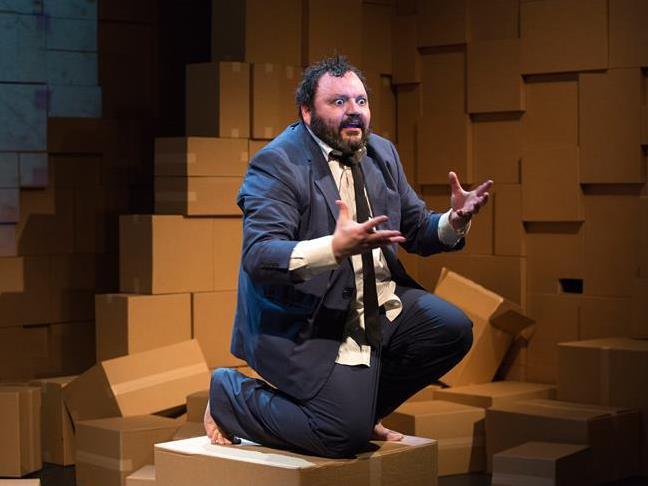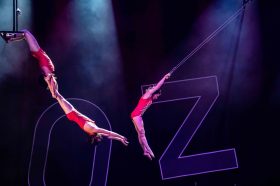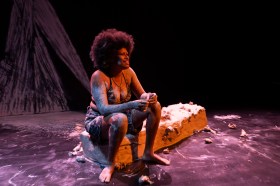Image by Andrew Curtis.
As audience attendees burst through the theatre doors, a formally suited man is already seated in the back isles. As theatre-goers meander to their seats, the befuddled person bumps and dodges his way in between the herd, staring at each person as if looking for something or someone.
It soon becomes apparent that this person is searching for a seat to his own opening night.
This is just the loco-beginnings of Alirio Zavarce’s semi-autobiographical one-man show. Winner of the Best Theatre Production Award at the 2013 Adelaide Fringe Festival, Zavarce both writes and stars in The Book of Loco, an explorative journey of his ‘theory of rational madness’.
Set in front of a walled jigsaw of cardboard boxes, the play navigates through the mundane to the cataclysmic states of everyday reality and examines how assumed logic can be altered based on perspective. The structure of the boxes acts as a representation of the protagonist’s own mental stability, with the boxes collapsing and reassembling in conjunction with Zavarce’s crumbling state of mind.
As the story develops, the audience begins to understand Zavarce’s view of the world, formed and molded through the death of his mother from cancer, the ending of his marriage due to infidelity and his struggles migrating from Venezuela to Australia. These personal scars are contrasted with tragedies removed from his own immediate experience, such as the September 11 terrorist attacks, the Holocaust and Australia’s asylum seeker policies. However, this attempt at attaining an all-encompassing view of public history is often too simplistic and lacking depth.
As stories are muddled and relayed incomprehensibly, sometimes in Spanish and often left unfinished, an ‘in case of emergency’ siren offers the only constant – and very soon the novelty wears off. The play’s manic change from themes of humour to drama are at times frustrating, with the audience struggling to completely dissolve into a certain mood or feeling, due to the sporadic nature of his conflicting tone of narrative.
The components of audience involvement are generally humorous and original and Zavarce’s effortless likeability never falters; this is particularly evident in his odd-ball routine of combing his hair back and forth to switch between his ‘rational’ or ‘mad’ personae.
While the play at times falters in terms of consistency, the video design by Chris More, sound by Duncan Campbell and lighting by David Gadsen are all excellent. The bursts of fleeting video projected on to the cardboard boxed wall is effectively structured and easily adapts to the play’s shifting contexts.
The Book of Loco’s agenda and meanings occasionally converges on the cheesy side, with sentiments of loving one another coming off as pedestrian and not in keeping with the generally unconventional line of dialogue. But despite this, The Book of Loco is still ultimately an enjoyable read, rescued by Zavarce’s acting prowess and unwavering commitment to both his character and contention.
Rating: 3 out of 5 starsThe Book of Loco
Director: Sasha Zahra
Writer & Cast: Alirio Zavarce
Set and Costume Design: Jonathon Oxlade
Projection: Chris More
Sound Design: Duncan Campbell
Lighting Design: David Gasden
Producer: Janine Peacock, Loose Canon Art Services
Beckett Theatre, Malthouse Theatre, Southbank
www.malthousetheatre.com.au
17 July- 2 August





